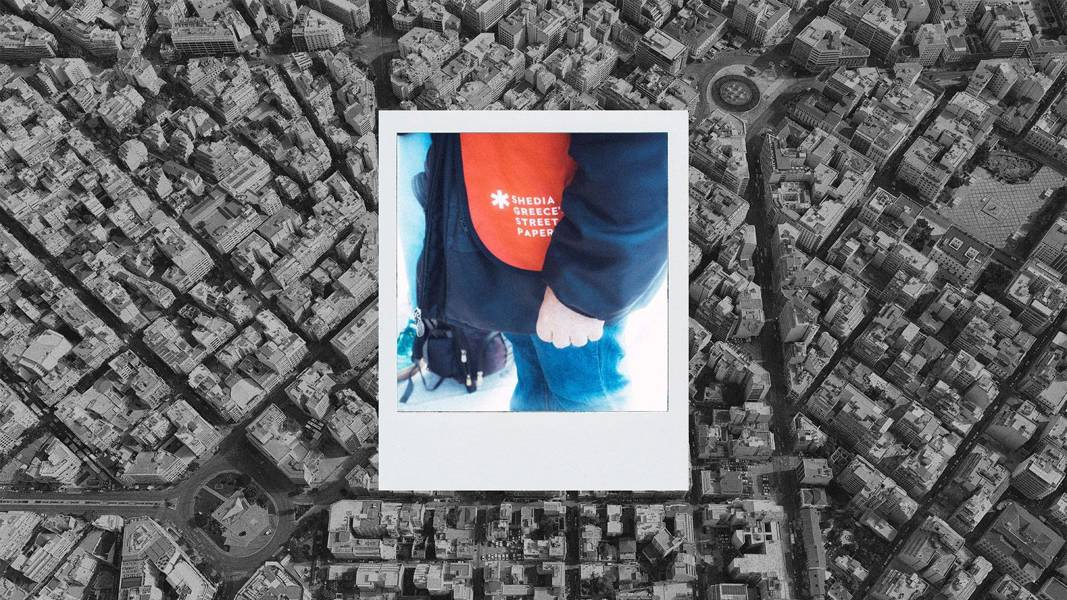On Friday morning, we meet up at 10 a.m. at the Metaxourgeio metro station. Mr. Michalis is waiting for us, sitting on a bench with a cigarette in his mouth, wearing the signature red vest of Shedia’s street magazine vendors. That’s how we knew it was him.

Athens through the eyes of people living in its streets
Konstantina:
“Good morning guys. I’m Michalis. I may not look it, but I’m homeless. Today, we’ll do Invisible Tours together.”
Born into a middle-class family, a relative in America was incentive enough for him to study at the Academy of Aeronautics and take English classes at Columbia. Despite the professional opportunities abroad, he returns to Greece and works alongside his brother as a truck owner. The death of his brother and the theft of his truck was the beginning of the end for life as he knew it until then. The raging economic crisis, the opportunities he was never given to work again and 5 months of unpaid rent put him out on the streets.
For 42 days he lived without a roof. He doesn’t tell us much about those days, he’s written them off. But he does tell us about the two suicide attempts he made during that time. Everything changes when Shedia street magazine comes into his life and then a new opportunity opens up for him.
We pass through streets that none of us have ever crossed before, places so close to those that are bustling with life on weekends, but so invisible to all of us who take it for granted that at the end of the day we will return home. “Do you know who I am? I am your neighbor, your friend, the man who lives in the apartment next door.”
This phrase made me rethink a lot of things. I had always had this image in my mind that people who experienced homelessness were people who grew up in poverty and were, in a way, predestined to end up in homelessness—which turned out to be completely wrong. Mr. Michalis was educated, had a family and a steady job; in other words, he had everything one would call a “normal life.” But one setback, one twist of fate in what he considered normal was enough to radically change his life. But he kept on trying, despite the challenges he is faced with every day. And this filled me with a profound sense of optimism and hope.
Markos:
It was almost noon and on my way up the stairs of the Metaxourgeio metro station I met up with the rest of the interns at Karaiskaki Square. Next to us sat a man wearing a red vest and holding some magazines in his hand.
He approached us with a smile and introduced himself. He was Michalis, our “Invisible Routes” guide and one of the vendors of the Shedia street magazine.
I will not recount his story which, while distressing, was experienced by many people in multiple variations during the crisis. He narrated it himself with a detached neutrality that was shocking. He studied, worked, traveled and in the end, in the midst of the crisis, he found himself on the street. He did not ask for pity or compassion. He knows that it could have been anyone in his position.
First stop, Vathis Square. The City of Athens Reception & Solidarity Center. Home to Michalis and about 200 other people. This is where they eat, shower, get clean clothes, underwear, and shoes. We continue to the National Theatre, Praksis’s Day Center, KYADA’s soup kitchen, the medical clinic and social pharmacy of Doctors of the World, and the offices of the organization Positive Voice to arrive at Shedia Home, the base of the magazine, which operates as a café, restaurant, and workshop and employs people who were otherwise unemployed.
Along the route, you encounter one of the biggest problems of poverty. Inertia. You lose touch with people, music, arts, and culture, and someone who has worked all their life may need the work even more than the money as this inertia crushes them. Our everyday life is not indestructible and the line between “I have” and “I don’t have” and “I see” and “I don’t see” is very thin. The shelters and organizations are centrally located, in mundane buildings and streets that nevertheless carry the stories of people who have witnessed their lives turned upside down.
Michalis never asked for anything, only to be seen and heard. Through “Invisible Tours,” these people claim a voice and invite us to walk alongside them through their own map of the city.
* SNF has supported the nonprofit Diogenis through grants, including for the launch of the first street magazine in Greece, Shedia, as well as the renovation of a building in Central Athens for the creation of Shedia Home.
Photos: Markos Palaiologos, Charilaos Ziavras